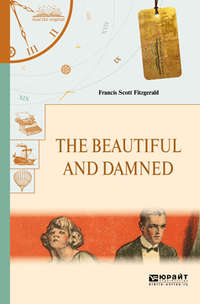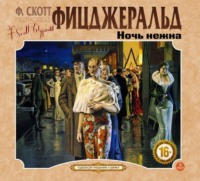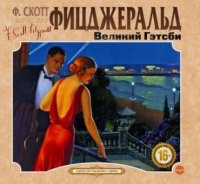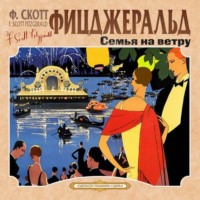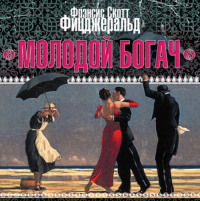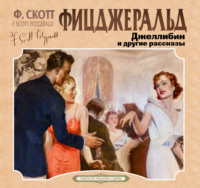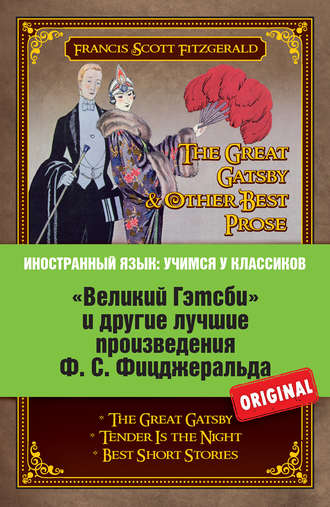
Полная версия
«Великий Гэтсби» и другие лучшие произведения Ф.С. Фицджеральда
‘Very romantic,’ he said, and then miserably to me: ‘If it’s light enough after dinner, I want to take you down to the stables.’
The telephone rang inside, startlingly, and as Daisy shook her head decisively at Tom the subject of the stables, in fact all subjects, vanished into air. Among the broken fragments of the last five minutes at table I remember the candles being lit again, pointlessly, and I was conscious of wanting to look squarely at every one, and yet to avoid all eyes. I couldn’t guess what Daisy and Tom were thinking, but I doubt if even Miss Baker, who seemed to have mastered a certain hardy scepticism, was able utterly to put this fifth guest’s shrill metallic urgency out of mind. To a certain temperament the situation might have seemed intriguing – my own instinct was to telephone immediately for the police.
The horses, needless to say, were not mentioned again. Tom and Miss Baker, with several feet[23] of twilight between them, strolled back into the library, as if to a vigil beside a perfectly tangible body, while, trying to look pleasantly interested and a little deaf, I followed Daisy around a chain of connecting verandas to the porch in front. In its deep gloom we sat down side by side on a wicker settee.
Daisy took her face in her hands as if feeling its lovely shape, and her eyes moved gradually out into the velvet dusk. I saw that turbulent emotions possessed her, so I asked what I thought would be some sedative questions about her little girl.
‘We don’t know each other very well, Nick,’ she said suddenly. ‘Even if we are cousins. You didn’t come to my wedding.’
‘I wasn’t back from the war.’
‘That’s true.’ She hesitated. ‘Well, I’ve had a very bad time, Nick, and I’m pretty cynical about everything.’
Evidently she had reason to be. I waited but she didn’t say any more, and after a moment I returned rather feebly to the subject of her daughter.
‘I suppose she talks, and – eats, and everything.’
‘Oh, yes.’ She looked at me absently. ‘Listen, Nick; let me tell you what I said when she was born. Would you like to hear?’
‘Very much.’
‘It’ll show you how I’ve gotten to feel about – things. Well, she was less than an hour old and Tom was God knows where. I woke up out of the ether with an utterly abandoned feeling, and asked the nurse right away if it was a boy or a girl. She told me it was a girl, and so I turned my head away and wept. “All right,” I said, “I’m glad it’s a girl. And I hope she’ll be a fool – that’s the best thing a girl can be in this world, a beautiful little fool.”
‘You see I think everything’s terrible anyhow,’ she went on in a convinced way. ‘Everybody thinks so – the most advanced people. And Iknow. I’ve been everywhere and seen everything and done everything.’ Her eyes flashed around her in a defiant way, rather like Tom’s, and she laughed with thrilling scorn. ‘Sophisticated – God, I’m sophisticated!’
The instant her voice broke off, ceasing to compel my attention, my belief, I felt the basic insincerity of what she had said. It made me uneasy, as though the whole evening had been a trick of some sort to exact a contributory emotion from me. I waited, and sure enough, in a moment she looked at me with an absolute smirk on her lovely face, as if she had asserted her membership in a rather distinguished secret society to which she and Tom belonged.
* * *Inside, the crimson room bloomed with light. Tom and Miss Baker sat at either end of the long couch and she read aloud to him from the Saturday Evening Post[24] – the words, murmurous and uninflected, running together in a soothing tune. The lamp-light, bright on his boots and dull on the autumn-leaf yellow of her hair, glinted along the paper as she turned a page with a flutter of slender muscles in her arms.
When we came in she held us silent for a moment with a lifted hand.
‘To be continued,’ she said, tossing the magazine on the table, ‘in our very next issue.’
Her body asserted itself with a restless movement of her knee, and she stood up.
‘Ten o’clock,’ she remarked, apparently finding the time on the ceiling. ‘Time for this good girl to go to bed.’
‘Jordan’s going to play in the tournament tomorrow,’ explained Daisy, ‘over at Westchester.’
‘Oh – you’reJordan Baker.’
I knew now why her face was familiar – its pleasing contemptuous expression had looked out at me from many rotogravure[25] pictures of the sporting life at Asheville[26] and Hot Springs[27] and Palm Beach[28]. I had heard some story of her too, a critical, unpleasant story, but what it was I had forgotten long ago.
‘Good night,’ she said softly. ‘Wake me at eight won’t you.’
‘If you’ll get up.’
‘I will. Good night, Mr. Carraway. See you anon.’
‘Of course you will,’ confirmed Daisy. ‘In fact I think I’ll arrange a marriage. Come over often, Nick, and I’ll sort of – oh – fling you together. You know – lock you up accidentally in linen closets and push you out to sea in a boat, and all that sort of thing —’
‘Good night,’ called Miss Baker from the stairs. ’I haven’t heard a word.’
‘She’s a nice girl,’ said Tom after a moment. ‘They oughtn’t to let her run around the country this way.’
‘Who oughtn’t to?’ inquired Daisy coldly.
‘Her family.’
‘Her family is one aunt about a thousand years old. Besides, Nick’s going to look after her, aren’t you, Nick? She’s going to spend lots of week-ends out here this summer. I think the home influence will be very good for her.’
Daisy and Tom looked at each other for a moment in silence.
‘Is she from New York?’ I asked quickly.
‘From Louisville[29]. Our white girlhood was passed together there. Our beautiful white —’
‘Did you give Nick a little heart to heart talk on the veranda?’ demanded Tom suddenly.
‘Did I?’ She looked at me. ‘I can’t seem to remember, but I think we talked about the Nordic race. Yes, I’m sure we did. It sort of crept up on us and first thing you know – ’
‘Don’t believe everything you hear, Nick,’ he advised me.
I said lightly that I had heard nothing at all, and a few minutes later I got up to go home. They came to the door with me and stood side by side in a cheerful square of light. As I started my motor Daisy peremptorily called: ‘Wait!
‘I forgot to ask you something, and it’s important. We heard you were engaged to a girl out West.’
‘That’s right,’ corroborated Tom kindly. ‘We heard that you were engaged.’
‘It’s a libel. I’m too poor.’
‘But we heard it,’ insisted Daisy, surprising me by opening up again in a flower-like way. ‘We heard it from three people, so it must be true.’
Of course I knew what they were referring to, but I wasn’t even vaguely engaged. The fact that gossip had published the banns was one of the reasons I had come East. You can’t stop going with an old friend on account of rumours, and on the other hand I had no intention of being rumoured into marriage.
Their interest rather touched me and made them less remotely rich – nevertheless, I was confused and a little disgusted as I drove away. It seemed to me that the thing for Daisy to do was to rush out of the house, child in arms – but apparently there were no such intentions in her head. As for Tom, the fact that he ‘had some woman in New York’ was really less surprising than that he had been depressed by a book. Something was making him nibble at the edge of stale ideas as if his sturdy physical egotism no longer nourished his peremptory heart.
Already it was deep summer on roadhouse roofs and in front of wayside garages, where new red petrol-pumps sat out in pools of light and when I reached my estate at West Egg I ran the car under its shed and sat for a while on an abandoned grass roller in the yard. The wind had blown off, leaving a loud, bright night, with wings beating in the trees and a persistent organ sound as the full bellows of the earth blew the frogs full of life. The silhouette of a moving cat wavered across the moonlight, and, turning my head to watch it, I saw that I was not alone – fifty feet away a figure had emerged from the shadow of my neighbour’s mansion and was standing with his hands in his pockets regarding the silver pepper of the stars. Something in his leisurely movements and the secure position of his feet upon the lawn suggested that it was Mr. Gatsby himself, come out to determine what share was his of our local heavens.
I decided to call to him. Miss Baker had mentioned him at dinner, and that would do for an introduction. But I didn’t call to him, for he gave a sudden intimation that he was content to be alone – he stretched out his arms toward the dark water in a curious way, and, far as I was from him, I could have sworn he was trembling. Involuntarily I glanced seaward – and distinguished nothing except a single green light, minute and far away, that might have been the end of a dock. When I looked once more for Gatsby he had vanished, and I was alone again in the unquiet darkness.
Chapter II
About half way between West Egg and New York the motor road hastily joins the railroad and runs beside it for a quarter of a mile, so as to shrink away from a certain desolate area of land. This is a valley of ashes – a fantastic farm where ashes grow like wheat into ridges and hills and grotesque gardens; where ashes take the forms of houses and chimneys and rising smoke and, finally, with a transcendent effort, of ash-grey men, who move dimly and already crumbling through the powdery air. Occasionally a line of grey cars crawls along an invisible track, gives out a ghastly creak, and comes to rest, and immediately the ash-grey men swarm up with leaden spades and stir up an impenetrable cloud, which screens their obscure operations from your sight.
But above the grey land and the spasms of bleak dust which drift endlessly over it, you perceive, after a moment, the eyes of Doctor T. J. Eckleburg[30]. The eyes of Doctor T. J. Eckleburg are blue and gigantic – their retinas are one yard high. They look out of no face, but, instead, from a pair of enormous yellow spectacles which pass over a non-existent nose. Evidently some wild wag of an oculist set them there to fatten his practice in the borough of Queens, and then sank down himself into eternal blindness, or forgot them and moved away. But his eyes, dimmed a little by many paintless days, under sun and rain, brood on over the solemn dumping ground.
The valley of ashes is bounded on one side by a small foul river, and, when the drawbridge is up to let barges through, the passengers on waiting trains can stare at the dismal scene for as long as half an hour. There is always a halt there of at least a minute, and it was because of this that I first met Tom Buchanan’s mistress.
The fact that he had one was insisted upon wherever he was known. His acquaintances resented the fact that he turned up in popular cafes with her and, leaving her at a table, sauntered about, chatting with whomsoever he knew. Though I was curious to see her, I had no desire to meet her – but I did. I went up to New York with Tom on the train one afternoon, and when we stopped by the ash heaps he jumped to his feet and taking hold of my elbow, literally forced me from the car.
‘We’re getting off,’ he insisted. ‘I want you to meet my girl.’
I think he’d tanked up a good deal at luncheon, and his determination to have my company bordered on violence. The supercilious assumption was that on Sunday afternoon I had nothing better to do.
I followed him over a low whitewashed railroad fence, and we walked back a hundred yards along the road under Doctor Eckleburg’s persistent stare. The only building in sight was a small block of yellow brick sitting on the edge of the waste land, a sort of compact Main Street ministering to it, and contiguous to absolutely nothing. One of the three shops it contained was for rent and another was an all-night restaurant approached by a trail of ashes; the third was a garage –Repairs. GEORGE B. WILSON. Cars bought and sold. – and I followed Tom inside.
The interior was unprosperous and bare; the only car visible was the dust-covered wreck of a Ford which crouched in a dim corner. It had occurred to me that this shadow of a garage must be a blind, and that sumptuous and romantic apartments were concealed overhead, when the proprietor himself appeared in the door of an office, wiping his hands on a piece of waste. He was a blond, spiritless man, anaemic, and faintly handsome. When he saw us a damp gleam of hope sprang into his light blue eyes.
‘Hello, Wilson, old man,’ said Tom, slapping him jovially on the shoulder. ‘How’s business?’
‘I can’t complain,’ answered Wilson unconvincingly. ‘When are you going to sell me that car?’
‘Next week; I’ve got my man working on it now.’
‘Works pretty slow, don’t he?’
‘No, he doesn’t,’ said Tom coldly. ‘And if you feel that way about it, maybe I’d better sell it somewhere else after all.’
‘I don’t mean that,’ explained Wilson quickly. ‘I just meant —’
His voice faded off and Tom glanced impatiently around the garage. Then I heard footsteps on a stairs, and in a moment the thickish figure of a woman blocked out the light from the office door. She was in the middle thirties, and faintly stout, but she carried her flesh sensuously as some women can. Her face, above a spotted dress of dark blue crepe-de-chine, contained no facet or gleam of beauty, but there was an immediately perceptible vitality about her as if the nerves of her body were continually smouldering. She smiled slowly and, walking through her husband as if he were a ghost, shook hands with Tom, looking him flush in the eye. Then she wet her lips, and without turning around spoke to her husband in a soft, coarse voice:
‘Get some chairs, why don’t you, so somebody can sit down.’
‘Oh, sure,’ agreed Wilson hurriedly, and went toward the little office, mingling immediately with the cement colour of the walls. A white ashen dust veiled his dark suit and his pale hair as it veiled everything in the vicinity – except his wife, who moved close to Tom.
‘I want to see you,’ said Tom intently ‘Get on the next train.’
‘All right.’
‘I’ll meet you by the news-stand on the lower level.’
She nodded and moved away from him just as George Wilson emerged with two chairs from his office door.
We waited for her down the road and out of sight. It was a few days before the Fourth of July[31], and a grey, scrawny Italian child was setting torpedoes in a row along the railroad track.
‘Terrible place, isn’t it,’ said Tom, exchanging a frown with Doctor Eckleburg.
‘Awful.’
‘It does her good to get away.’
‘Doesn’t her husband object?’
‘Wilson? He thinks she goes to see her sister in New York. He’s so dumb he doesn’t know he’s alive.’
So Tom Buchanan and his girl and I went up together to New York – or not quite together, for Mrs. Wilson sat discreetly in another car. Tom deferred that much to the sensibilities of those East Eggers who might be on the train.
She had changed her dress to a brown figured muslin[32], which stretched tight over her rather wide hips as Tom helped her to the platform in New York. At the news-stand she bought a copy of Town Tattle[33] and a moving-picture magazine, and in tile station drug-store some cold cream and a small flask of perfume. Upstairs, in the solemn echoing drive she let four taxicabs drive away before she selected a new one, lavender-coloured with grey upholstery, and in this we slid out from the mass of the station into the glowing sunshine. But immediately she turned sharply from the window and, leaning forward, tapped on the front glass.
‘I want to get one of those dogs,’ she said earnestly. ‘I want to get one for the apartment. They’re nice to have – a dog.’
We backed up to a grey old man who bore an absurd resemblance to John D. Rockefeller[34]. In a basket swung from his neck cowered a dozen very recent puppies of an indeterminate breed.
‘What kind are they?’ asked Mrs. Wilson eagerly, as he came to the taxi-window.
‘All kinds. What kind do you want, lady?’
‘I’d like to get one of those police dogs; I don’t suppose you got that kind?’
The man peered doubtfully into the basket, plunged in his hand and drew one up, wriggling, by the back of the neck.
‘That’s no police dog,’ said Tom.
‘No, it’s not exactly a police dog,’ said the man with disappointment in his voice. ‘It’s more of an Airedale.’ He passed his hand over the brown washrag of a back. ‘Look at that coat. Some coat. That’s a dog that’ll never bother you with catching cold.’
‘I think it’s cute,’ said Mrs. Wilson enthusiastically. ‘How much is it?’
‘That dog?’ He looked at it admiringly. ‘That dog will cost you ten dollars.’
The Airedale – undoubtedly there was an Airedale concerned in it somewhere, though its feet were startlingly white – changed hands and settled down into Mrs. Wilson’s lap, where she fondled the weather-proof coat with rapture.
‘Is it a boy or a girl?’ she asked delicately.
‘That dog? That dog’s a boy.’
‘It’s a bitch,’ said Tom decisively. ‘Here’s your money. Go and buy ten more dogs with it.’
We drove over to Fifth Avenue, warm and soft, almost pastoral, on the summer Sunday afternoon. I wouldn’t have been surprised to see a great flock of white sheep turn the corner.
‘Hold on,’ I said, ‘I have to leave you here.’
‘No, you don’t,’ interposed Tom quickly. ‘Myrtle’ll be hurt if you don’t come up to the apartment. Won’t you, Myrtle?’
‘Come on,’ she urged. ‘I’ll telephone my sister Catherine. She’s said to be very beautiful by people who ought to know.’
‘Well, I’d like to, but —’
We went on, cutting back again over the Park toward the West Hundreds[35]. At 158th Street the cab stopped at one slice in a long white cake of apartment-houses. Throwing a regal homecoming glance around the neighbourhood, Mrs. Wilson gathered up her dog and her other purchases, and went haughtily in.
‘I’m going to have the McKees come up,’ she announced as we rose in the elevator. ‘And, of course, I got to call up my sister, too.’
The apartment was on the top floor – a small living-room, a small dining-room, a small bedroom, and a bath. The living-room was crowded to the doors with a set of tapestried furniture entirely too large for it, so that to move about was to stumble continually over scenes of ladies swinging in the gardens of Versailles[36]. The only picture was an over-enlarged photograph, apparently a hen sitting on a blurred rock. Looked at from a distance, however, the hen resolved itself into a bonnet, and the countenance of a stout old lady beamed down into the room. Several old copies of Town Tattle lay on the table together with a copy of Simon Called Peter[37], and some of the small scandal magazines of Broadway. Mrs. Wilson was first concerned with the dog. A reluctant elevator-boy went for a box full of straw and some milk, to which he added on his own initiative a tin of large, hard dog-biscuits – one of which decomposed apathetically in the saucer of milk all afternoon. Meanwhile Tom brought out a bottle of whisky from a locked bureau door.
I have been drunk just twice in my life, and the second time was that afternoon; so everything that happened has a dim, hazy cast over it, although until after eight o’clock the apartment was full of cheerful sun. Sitting on Tom’s lap Mrs. Wilson called up several people on the telephone; then there were no cigarettes, and I went out to buy some at the drugstore on the corner. When I came back they had both disappeared, so I sat down discreetly in the living-room and read a chapter ofSimon Called Peter – either it was terrible stuff or the whisky distorted things, because it didn’t make any sense to me.
Just as Tom and Myrtle (after the first drink Mrs. Wilson and I called each other by our first names) reappeared, company commenced to arrive at the apartment-door.
The sister, Catherine, was a slender, worldly girl of about thirty, with a solid, sticky bob of red hair, and a complexion powdered milky white. Her eyebrows had been plucked and then drawn on again at a more rakish angle, but the efforts of nature toward the restoration of the old alignment gave a blurred air to her face. When she moved about there was an incessant clicking as innumerable pottery bracelets jingled up and down upon her arms. She came in with such a proprietary haste, and looked around so possessively at the furniture that I wondered if she lived here. But when I asked her she laughed immoderately, repeated my question aloud, and told me she lived with a girl friend at a hotel.
Mr. McKee was a pale, feminine man from the flat below. He had just shaved, for there was a white spot of lather on his cheekbone, and he was most respectful in his greeting to everyone in the room. He informed me that he was in the ‘artistic game’, and I gathered later that he was a photographer and had made the dim enlargement of Mrs. Wilson’s mother which hovered like an ectoplasm on the wall. His wife was shrill, languid, handsome, and horrible. She told me with pride that her husband had photographed her a hundred and twenty-seven times since they had been married.
Mrs. Wilson had changed her costume some time before, and was now attired in an elaborate afternoon dress of cream-coloured chiffon, which gave out a continual rustle as she swept about the room. With the influence of the dress her personality had also undergone a change. The intense vitality that had been so remarkable in the garage was converted into impressive hauteur. Her laughter, her gestures, her assertions became more violently affected moment by moment, and as she expanded the room grew smaller around her, until she seemed to be revolving on a noisy, creaking pivot through the smoky air.
‘My dear,’ she told her sister in a high, mincing shout, ‘most of these fellas will cheat you every time. All they think of is money. I had a woman up here last week to look at my feet, and when she gave me the bill you’d of thought she had my appendicitis out.’
‘What was the name of the woman?’ asked Mrs. McKee.
‘Mrs. Eberhardt. She goes around looking at people’s feet in their own homes.’
‘I like your dress,’ remarked Mrs. McKee, ‘I think it’s adorable.’
Mrs. Wilson rejected the compliment by raising her eyebrow in disdain.
‘It’s just a crazy old thing,’ she said. ‘I just slip it on sometimes when I don’t care what I look like.’
‘But it looks wonderful on you, if you know what I mean,’ pursued Mrs. McKee. ‘If Chester could only get you in that pose I think he could make something of it.’
We all looked in silence at Mrs. Wilson, who removed a strand of hair from over her eyes and looked back at us with a brilliant smile. Mr. McKee regarded her intently with his head on one side, and then moved his hand back and forth slowly in front of his face.
‘I should change the light,’ he said after a moment. ‘I’d like to bring out the modeling of the features. And I’d try to get hold of all the back hair.’
‘I wouldn’t think of changing the light,’ cried Mrs. McKee. ‘I think it’s – ’
Her husband said: ‘Sh!’ and we all looked at the subject again, whereupon Tom Buchanan yawned audibly and got to his feet.
‘You McKees have something to drink,’ he said. ‘Get some more ice and mineral water, Myrtle, before everybody goes to sleep.’
‘I told that boy about the ice.’ Myrtle raised her eyebrows in despair at the shiftlessness of the lower orders. ‘These people! You have to keep after them all the time.’
She looked at me and laughed pointlessly. Then she flounced over to the dog, kissed it with ecstasy, and swept into the kitchen, implying that a dozen chefs awaited her orders there.
‘I’ve done some nice things out on Long Island,’ asserted Mr. McKee.
Tom looked at him blankly.
‘Two of them we have framed downstairs.’
‘Two what?’ demanded Tom.
‘Two studies. One of them I call “Montauk Point – The Gulls”, and the other I call “Montauk Point – The Sea”.’
The sister Catherine sat down beside me on the couch.
‘Do you live down on Long Island, too?’ she inquired.
‘I live at West Egg.’
‘Really? I was down there at a party about a month ago. At a man named Gatsby’s. Do you know him?’
‘I live next door to him.’
‘Well, they say he’s a nephew or a cousin of Kaiser Wilhelm’s[38]. That’s where all his money comes from.’






